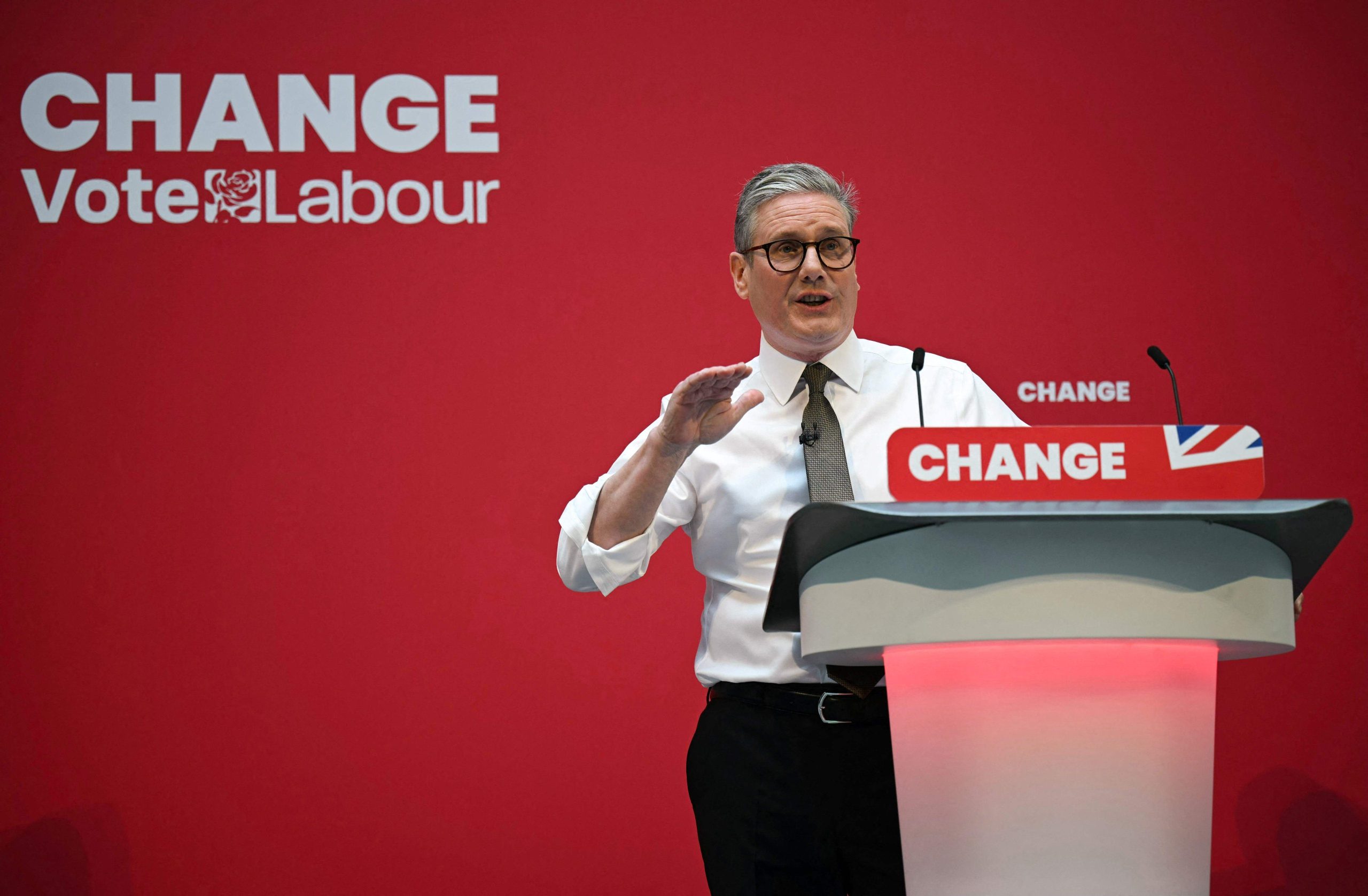Kolumnit
1.7.2024 16:37 ・ Päivitetty: 1.7.2024 16:57
Britannian vaalit for dummies – näillä helpoilla tärpeillä pystyt juttelemaan vaaliaiheista vaikka baarissa englanniksi
Mistä kiistanaiheista britit äänestävät 4. heinäkuuta, mitä Britannian tämän hetken politiikasta yleensä pitäisi tietää – saati puhua natiivien kanssa?
Kielikouluttaja, espoolaistunut britti Rupert Harding laati suomalaisille helpon yhteenvedon parlamenttivaalien keskeisistä tekijöistä, jolla saa asiantuntijan maineen vaikka baariväittelyissä englanniksi.
Tutut vaalien pääteemat
Polling company Yougov has identified the cost of living, health, the economy and the environment as the key issues in the election.
All of these are things that Finns can relate to, but they hit different in Britain – sometimes in surprising ways.
Arki on liian kallista elämiseen
The “cost of living crisis” has been acute. As in Finland, real earnings have barely risen in twenty years; but the impact on poorer people has been greater in the UK. Inflation lasted for longer and peaked higher.
Imports are even more expensive because of Brexit. Housing costs eat up a considerably larger share of disposable income, and – despite the UK’s lower unemployment rate – the percentage of the population in poverty is double that in Finland.
This has resulted in many people – even those in work – reduced to relying on food banks on a regular basis. Homelessness is visible in every town and city.
Lisää aiheesta

Miljonääripääministeri, konservatiivien Rishi Sunak tutki kiertueellaan myös hummerisatoa kalastajien kanssa.
Brittien sotekriisi on vielä meitä kamalampi
The health sector is in crisis. The National Health Service (NHS) – the centrepiece of the British welfare state – was set under the principle that treatment should be completely free at the point of use. No government right or left has dared to change that.
Parts of it remain world class, but by most metrics it has been underperforming, with long waiting lists and poor outcomes overall in international comparison. The model as it currently exists appears unsustainable.
Even Labour – the creator and champion of the system – is now describing it
as broken. Labour says it would cut waiting times, the Tories that they would develop primary care service.
Yet professionals are sceptical; a new government’s ability to invest in making the necessary improvements will be severely limited.
Velkakriisiä ja taantumaa pukkaa
The UK economy appears to be picking up with inflation and interest rates down, but growth projections for the rest of the decade are far from spectacular. Productivity remains low and, because the population is rising so rapidly (see immigration), GDP per capita is actually falling.
Meanwhile, if Finland’s public finances appear shaky, Britain’s look considerably worse.
Government debt is now 100 % of GDP as against 74 % in Finland. Borrowing costs have risen sharply and the next government will have little scope either to cut taxes or provide stimulus.
Maahanmuutto on populistien mörkö
Immigration is not a top issue among all voters – only about a quarter put it in the top five – but it is for many Conservatives and most of those intending to vote for Reform UK, the party created by Nigel Farage, the former leader of the Brexit party.
The UK’s population has grown by 10 million in 30 years through migration without anything like sufficient housing or services put in place for the new arrivals.
The 40,000 asylum seekers crossing the Channel from France illegally each year catch much of the media attention, but net legal migration in each of the last two years since the pandemic has been over 650,000.
The Tories have made arrangements to send those entering the country illegally to Rwanda. Labour has said it would scrap this plan and go after the gangs that facilitate the crossings.
It would be fair to say that migration has not in general been planned or managed well. It’s also easy to dismiss negative attitudes to immigration as racist, but the picture is more nuanced; and since Brexit the UK, Wales and Scotland have all had non-white heads of government.
Those that believe that migration is overwhelming public services should remember that over a fifth of the 1,3 million staff working in the health service are non-UK nationals, as are fully one third of doctors. Britain has become to a degree dependent on foreign labour.

Populistijohtaja Nigel Farage sai kesäkuussa protestoijalta juomaa naamalleen.
Ilmasto- ja energiakriisiä vetoisissa taloissa
British people are typically small ‘c’ conservative – they don’t like change for the sake of change. For the environment the effect of this attitude is mixed.
On the one hand, Britons have been keen to preserve the charm of the countryside, with its patterns of fields that date back a thousand years, and protect it from uncontrolled development.
On the other, older people have been sceptical about new green technologies, be they electric vehicles, wind and solar generation, or heat pumps.
That conservatism stretches to housing. British people have tended to like old stuff, and Britain’s housing stock is some of the oldest in Europe.
Poorly insulated houses heated by gas were not a problem when energy was cheap; but after the price shock resulting from Vladimir Putin’s war of aggression means people are urgently looking for new solutions.
Labour’s support for renewables, new homes and a programme of insulating older houses appear popular, especially with younger voters.
Tyly vaalijärjestelmä – voittaja vie kaiken
The nature of the UK political system with first-past-the-post – the candidate with the most votes in each geographical district is elected MP – affects outcomes in a variety of ways.
This time – for the first time – there is a challenger party from the right (Reform UK) that looks set to attract a substantial share of the Conservative vote; but experience shows that it is extremely hard for a third party to break the duopoly of the two major parties.
In the 1983 general election, the Labour breakaway Social Democratic Party won over 25 % of the vote but won only 23 out of 625 seats. Concentrations of voters are what matters: in 2019 the Scottish National Party won 48 seats with 3,9 % of the vote, while the Liberals with almost 12 % won only 11.
The only way to win power has been from within either of the two main parties. In effect, the two larger parties are uneasy coalitions.
Within each party these factions fight for supremacy like rats in a sack.
The Conservatives reflect a set of views ranging from the socially liberal end of Kokoomus to hardcore Perussuomalaiset – but with much greater discipline regarding overtly racist messaging.
Meanwhile Labour covers centre left Social Democrats and Vasemmistoliitto style Democratic Socialists; its activists typically lean further left than its voters.
Ei kiitos vaalikoneita – puolueen linja on ehdokkaan linja
Within each party these factions fight for supremacy like rats in a sack. There is one candidate for each party in each constituency: who that is the decision of the local party.
A tool like the vaalikone rolled out for Finnish elections is unimaginable: candidates stand committed to the party programmes or manifestos published in the run up to the election, and party discipline allows for almost no deviation from the policy lines set out in them.

Työväenpuolueen johtaja Keir Starmer pyrkii enää välttämään viimeisten päivien virheet.
Kuka pääministeriksi: elitistinen miljonääri, varovainen demarirobotti vai kovan linjan populisti?
Neither leader excites the public much. Tories Rishi Sunak’s privileged background and enormous wealth alienates him from the majority of the electorate, and he lacks Boris Johnson’s ability to reach out to traditional Labour voters.
Labour’s Keir Starmer has appeared grey and robotic at public events, although he has improved considerably since becoming leader.
Nigel Farage – back in politics as Reform UK leader again – has considerably more charisma than both and has the potential to turn the election into a catastrophe for the Tories.
All Labour have had to do is appear to be a safe pair of hands.
Britain’s top election expert put Labour’s chance of forming the next Government at 99 % – largely because people are so fed up with the Tories. All Labour have had to do is appear to be a safe pair of hands.
Before victory in 1997 Tony Blair was described as ‘like a man carrying a priceless Ming vase across a highly polished floor’.
The same is even more true of Keir Starmer now. There is little for activists to get excited about, and we have little sense of how Labour will act in government.
But it very much looks as if we’re going to find out.
Rupert Harding on Oxfordin yliopistosta valmistunut viestintävalmentaja ja kielikouluttaja. Suomessa hän on vuosien ajan opettanut englantia ja brittikulttuurin tapoja niin poliitikoille, virkamiehille kuin yrityselämän vaikuttajillekin.
Kommentit
Artikkeleita voi kommentoida yhden vuorokauden ajan julkaisuhetkestä. Kirjoita asiallisesti ja muita kunnioittaen. Ylläpito pidättää oikeuden poistaa sopimattomat viestit ja estää kirjoittajaa kommentoimasta.
